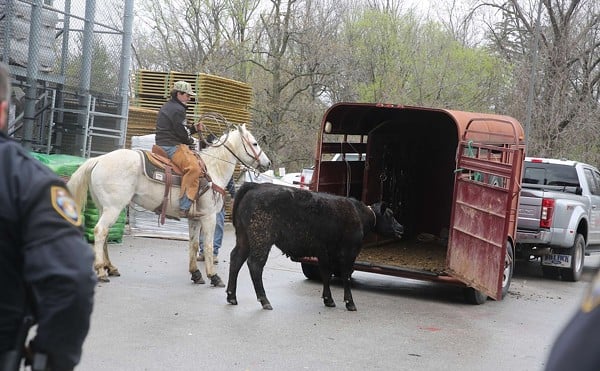When Bob Fritz took a test drive, the salesman offered him more than an ordinary spin down I-70. Fritz went flying and bouncing over logs and 5-foot berms on an obstacle course next to the dealership.
It was a tough introduction, but Fritz had had enough of the Olds 98 he was trading in. The vehicle he coveted was anything but your father's Oldsmobile. The retired oil-company executive from Town & County was trying out a Hummer -- a veritable minitank that replaced the Army's Jeep in the early '80s and hit the civilian marketplace in 1992. The vehicle first struck the public imagination during Operation Desert Storm, when it was called by its proper military name, the High Mobility Multipurpose Vehicle, or Humvee. Fritz had seen a Hummer on television, and he just had to have one.
Equally at home in the Arctic and the desert, the Hummer can go most anywhere, though not very quickly. With a top speed of 90 mph, the Hummer does zero to 60 in 18 seconds -- a sluglike time. It gets about a dozen miles to the gallon and costs more than $100,000. But Fritz doesn't care. Six years after that first test drive, he still remembers the day. "It was an experience like you've never had before," he recalls.
Fritz, who has since traded in that first Hummer for a newer model with a turbocharger, was hooked on the Hummer at Jim Lynch Hummer, a dealership just west of O'Fallon, Mo., that has quietly become the world's top seller of what is perhaps the biggest status symbol on wheels. You wouldn't know it from driving by. Just off Exit 214 on I-70, the entire dealership -- showroom, offices and service garage -- fits into a giant steel prefab building barely visible from the highway. Though utilitarian, the nondescript enterprise is the exact opposite of what a Hummer is known for: a loud proclamation that the driver is different, a rugged individualist in the mold of actor Arnold Schwarzenegger, pitcher Randy Johnson and goofball Dennis Rodman, all of whom drive Hummers and don't mind crappy factory paint jobs and 3-foot-wide transmission humps separating drivers and passengers. Boxer Mike Tyson owns four Hummers.
The typical Hummer owner is male, not afraid to take risks, and rich. Lynch, who vows he won't be undersold, advertises a Hummer with a $106,543 MSRP for $88,900. He estimates that 10 percent of his customers regularly drive their Hummers off-road, and at 7,200 pounds (four times the weight of a Chevy Metro) and 16 inches off the ground (half-a-foot higher than other production SUVs), these trucks can take it. Built to withstand drops from military airplanes, Hummers can ford rivers up to 30 inches deep, ramble across seemingly impassable gullies and even go through brick walls (check out "Stupid Hummer Tricks" and "Are Hummers Safe?" on Lynch's Web site, www.lynchhummer.com). Just 1,000 Hummers are produced each year, and Lynch, who sold 162 (including 71 used ones) last year, has the biggest share of the market. Competing against 50 other dealers across the nation, Lynch sells nearly twice as many as the next-biggest dealer, located in Arizona.
What's a dealership like this doing in a place like St. Louis, far from four-wheel country and Hollywood?
Once the general manager of a Toyota dealership owned by his father, Lynch got into the Hummer business shortly after buying one for himself in 1994. "I noticed that people would follow you into parking lots to talk to you about a Hummer," he recalls. "I decided then that the best form of advertising for us was going to be word-of-mouth advertising. So we started six years ago with the intention that we never wanted a customer to ever say anything bad about us."
Lynch seems to have met his no-complaints goal. When Bob Bish, Webmaster for www.humvee.net, polled Hummer enthusiasts a couple of years ago to find out what they thought of dealers, Jim Lynch came out on top. "Everyone rated him a 10 except for just one 9," Bish recalls. "Jim Lynch was far and away the best-rated one. I'm sure you'll find no one who has anything bad to say about Jim."
Lynch doesn't like to talk about his days selling Toyotas, but he does say he doesn't like the car-selling business, or at least the way it's commonly practiced -- too much attention to squeezing customers and hitting preset profit margins on every sale. Lynch Hummer is no common dealership, and Lynch has no plans to sell any other brand. Every employee, including his receptionist, has spent a week at AM General's Hummer plant in South Bend, Ind., to receive factory training on basic mechanics and driving techniques. "I think the mental state for car dealers is completely different than the way we look at things," Lynch says. "We do it differently, and we like the way we do it. I don't care if we make anything the first time someone comes in."
It may sound a bit like the usual car-dealer shtick, but Lynch customers do come back. Lynch has sold the same Hummer as many as four times, thanks to customers who have traded it in for newer models. Customers rave about everything from Lynch's prices to the dedication of his employees, who have been known to keep the dealership open late for out-of-town customers, who are personally greeted at the train station, which isn't necessarily surprising, considering a Hummer costs more than many houses in the St. Louis area.
Fritz, who bought the third Hummer that Lynch ever sold, says Lynch Hummer is unlike any other auto dealership. "They're like friends," says Fritz, whose second car is a GMC Yukon, one of the largest SUVs on the market. "They don't push you. They don't try to get you to buy one or anything. They just tell you what it is, they take you out for a test drive, take you through a little obstacle course and let you drive it."
David Simkins of New York, who owns a cellular-telephone company, became a Lynch fan in July at a Hummer rally in the Black Hills of South Dakota. Simkins broke the transmission transfer case on his Hummer during an ill-advised climb up a 12-foot waterfall and limped in from the field after 5 p.m. Lynch, who regularly attends Hummer events around the country, canceled happy hour and had his mechanics install a new transfer case on the spot. And he didn't charge a cent for labor. "They realized the situation I was in and got greasy again," Simkins recalls. They spent a few hours by drop lights out in the parking lot getting me back on the road. He could have waited until the next day and charged me double, and I still would have been happy."
It's all part of putting satisfaction ahead of profits. The way Lynch figures things, he'll eventually make money if he makes customers happy, even if he doesn't realize an immediate return. "We're trying to make a relationship with them so they'll never want to go anywhere else," he says.
Lynch, who does most of his business by telephone and e-mail, has a policy of quoting trade-in prices sight unseen and sticking to his word, no matter what. At times, such a philosophy can try his patience. Take the man in California who traded in his Hummer convertible -- he said his wife wanted a hardtop model. Lynch quoted him a trade-in price on the basis of a phone conversation. "He represented it had 1,600 miles on it, like new," Lynch recalls. "We got it in from California, had it trucked in, and looked at the truck. Oh, gosh. It wasn't a happy day. It was beat to hell. This guy, I think, left it in a swamp overnight. The interior had mud stains all over. The radiator was packed with mud. If that guy had taken an Explorer or a Jeep or something and done that, it would have been total junk. It wouldn't have been worth salvaging. But a Hummer, it was just kind of a mess." Lynch didn't back out of the deal, even though he ended up losing money. "We probably spent $8,000 or $9,000 on that truck, over and above what was warrantied, getting it back into good shape," he says. "By the time it left here, it was like new again."
Fewer than 10 of the Hummers Lynch sold last year stayed in Missouri. He's shipped vehicles to customers as far away as Japan and Russia. He's sold one to Lambert Field, which uses it as a fire-rescue rig. And every one, new or used, comes with a money-back guarantee: If a customer isn't happy when his or her Hummer shows up, Lynch will take it back, no questions asked, and eat the shipping costs, which can amount to more than $10,000 in the case of an overseas sale. After more than 600 sales, Lynch hasn't had one sent back.
Whether Lynch can remain king of the Hummer dealers is questionable. Last year, General Motors bought the Hummer brand, signing a contract with AM General to produce tens of thousands of Hummers and bankrolling a $200 million plant in Mishawaka, Ind., where AM General will manufacture Hummers that will be sold by GM. Although production of the current model is not expected to increase, GM is designing a more affordable Hummer, called the H2, that will debut in 2002 and sell for about $50,000, with projected sales of 40,000 in the first year. GM, which is counting on the Hummer to help recapture the company's dwindling market share, is already talking about designing an H3 and suggests that sales may eventually reach 150,000 Hummers per year. And so the number of dealerships will mushroom. Among other areas, GM is eyeing Kansas City, Chicago, Indiana and the New York area as locations for new Hummer dealerships.
Lynch has no guarantee GM will grant him a dealership, but he's confident enough that he's taken deposits for nine H2s. GM has also named him to a dealership advisory committee that is helping with marketing plans, including where new dealerships should be located. That bodes well for a franchise, Lynch says. But his business will change as competition grows. "I think it's going to be a little bit different," he predicts. "We grew this business by word of mouth from Hummer owners all over the country. I think our philosophy will work. But I don't think the word of mouth is going to be as strong with a less-of-a-niche vehicle."
Still, Lynch says he won't change his ways, and he's not worried: "I think it would be very hard for somebody to come in and do what we've done over the last six years," he says. "There's a lot of guys who've been trying."
Related Links:
Jim Lynch Hummer Web site:
www.lynchhummer.com
Humvee-enthusiasts Web site:
www.humvee.net





